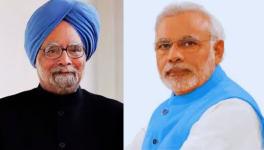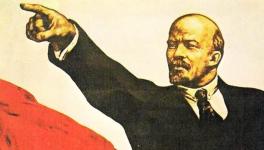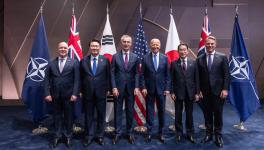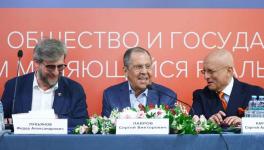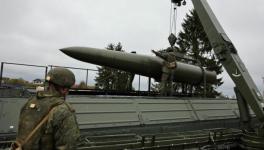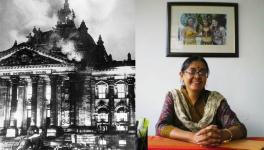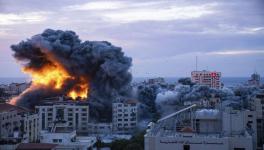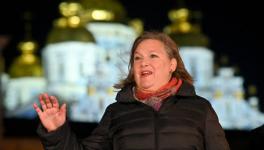It Wasn't Errol Flynn Who Won The War
There was a song British communists I knew used to sing: “It wasn’t Errol Flynn who won the war.”
They were reacting with typical wit to Hollywood film versions that reduced World War Two actions to the ridiculous heroics of American screen idols.
With the likes of Campbell and other Western leaders shunning the 70th Anniversary celebrations in Moscow it is relevant to remind people, and especially the young generation, of some key facts of that epic encounter that saved the world from fascist barbarism.
My fellow British comrades did not belittle the enormous sacrifice and contribution their country or America made in common with the people of the world to stop fascism. In the initial dark days of the war Britain was virtually alone - France, Belgium, Netherlands, Poland succumbing to Nazi invasion within weeks - and both the Soviet Union and USA only came into the conflict in June and December 1941 respectively. Chamberlain’s appeasement policy of Hitler had seen Czechoslovakia sacrificed in 1938.
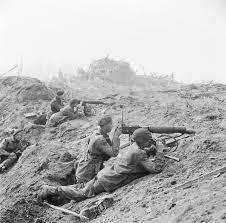
Image Courtesy: en.wikipedia.org
However for all the suffering and gallant contribution wartime Britain made, my comrades were well aware it was not the Battle of Britain (1940) with all the gallantry displayed by young RAF pilots; nor Montgomery’s victory over Rommel in the North African desert (1943); nor the much delayed opening of the Western Front (Normandy June 1944) that made the fundamental difference to the outcome. All aspects of the war effort against fascism were vital.
The main theatre of the war effort, however, took place on Germany’s Eastern Front with the Soviet Union, commencing on 22 June 1941 with Hitler unleashing the largest and most powerful invasion force in history. The aim in Hitler’s words was “the annihilation of the Russian people.”
Operation Barbarossa, as the anti-communist crusade was code named, involved 120 fascist divisions, along a front from the Baltic to the Black Sea, including divisions from Spain, Italy, Croatia, Rumania, Hungary, the Ukraine etc.
Hitler was so confident of success that he boasted of taking Moscow and Leningrad (today’s Petrograd) within six weeks and issued invitations to a victory banquet in the latter city. Purges that had weakened the Red Army, and errors of judgement by Stalin, saw the Nazis cutting through eastern Poland, the Baltic states, the Ukraine at an alarming rate.
With supreme effort and heroism the invaders were halted at the gates of Moscow and Leningrad. Whatever his errors, Stalin emerged as an inspirational leader as the Soviet people rallied behind the wr effort to drive back the invader.
Leningrad was besieged for 900 days with almost one million of its citizens perishing from starvation and bombardment. The tide turned first at Moscow, and then in what is accepted as the turning point of the war, at Stalingrad.
That city was under siege from August 1942 to March 1943. After a supreme effort the Nazi army was destroyed. Three hundred thousand Germans taken prisoner; almost an equal number perished. Soviet losses were treble that number. From that point the invaders were on the retreat attempting a last ditch effort to regain the initiative at the battle of Kursk in September 1943 which saw the greatest tank battle in history. Again the Nazis were defeated. Retreat for the enemy was the only option and they fought grimly to defend German territory and Hitler’s capital. By 1944 the writing was already on the wall when the Western Allies opened the Normandy front at great cost and bravery in the difficult landing from the sea. Allied forces had landed in Italy the year before from victory over Rommel in North Africa and slowly advanced north. A reflection of where the fighting raged in Europe is that the Germans deployed 150 divisions on the Eastern Front to 65 on the Western Front.
The culmination of the war took place in the battle for Berlin where the Red Army finally vanquished the Nazis who signed surrender terms on May 8, 1945. Hitler and several of his henchmen had committed suicide on 30 April. Germany’s formal surrender took place a week later. The war in the Far East ended in August after America dropped atomic bombs on an already defeated Japan. It was widely recognised that the unnecessary obliteration of Hiroshima and Nagasaki, with 350,000 Japanese civilian deaths, was a signal to the Soviet Union, that its erstwhile ally possessed unimaginable power and could do with monopoly of atomic weapons what Germany had failed to achieve. Hitler’s evil propaganda minister, Joseph Goebels, had already forecast that with Russia’s victory, “an iron curtain would ring down across Europe.” In those final days of the war the Nazis were hoping that America would come to a truce with them, and together they might act against the Soviet Union. German militarism had gone too far, however, in attacking Britain and France. The attempt with Mussolini’s Italy and Japan to replace the British Empire with a new world fascist order was for the ruling class unforgivable.
Common interests of survival against Hitler’s onslaught had led to the war time alliance with Russia. Post war geo-politics became the new international divide. It was Churchill, echoing Goebels, who warned the Americans at a speech at Fulton, USA in 1946, that together with Britain they needed to end co-operation with Russia and draw battle lines in a Cold War era.
How mean and uncharitable, that the Western leaders decided to boycott the70th Anniversary celebrations in Moscow. Much propaganda and lies are being spewed out in the West to conceal the true character of the Second World War, and the enormous debt humankind owes to the Russian and Soviet people of that time. They undoubtedly bore the brunt of the conflict, and saved the world from fascism. Yet those selfsame Western leaders, using NATO, have been manoeuvring to once again ring Russia with hostile states, and in the Ukraine they support neo-Nazis who murder people in the streets with impunity; and Kiev’s onslaught against the Donbass Region in the east.
The Second World War cost sixty million lives. Almost half of the casualties, an estimated 27 million, were Soviet citizens. Nine million Soviet troops gave their lives compared to 900,000 of the combined American and British forces. That is not counting the unimaginable destruction of an estimated 90,000 villages, 1000 towns, 100 cities and incalculable infrastructure. Apart from Pearl Harbour there was no attack on the American mainland. It is well known that the Nazis consigned six million Jews to the gas chambers, death by starvation and other forms of execution. Many millions of communists, Romer, gays, Slavs, Poles, anti-fascists from Germany and elsewhere, perished in those death camps and in the slaughter of resistance fighters and civilians in counties all over Europe by the Nazi Storm Troopers, Gestapo and fascist collaborators.
There is no reason not to honour all who perished. By concealing the truth for modern day geo-political reasons the youth of the world are prevented from learning from history. The danger is that future generations are condemned to commit the same fatal mistakes all over again. Fascism is on the rise in many parts of Europe. The contagion can spread and must be halted by the same determination and unity evidenced during World War Two.
On May 9th in Moscow, an “Immortal Regiment,” 300,000 Muscovites of all ages, carried photographs of family members who fought in theThe Great Patriotic War.” Putin carried a photograph of his father. The portrait of Eroll Flynn was not to be seen.
Ronnie Kasrils (Former South African Minister of Intelligence)
Disclaimer: The views expressed here are the author's personal views, and do not necessarily represent the views of Newsclick
Get the latest reports & analysis with people's perspective on Protests, movements & deep analytical videos, discussions of the current affairs in your Telegram app. Subscribe to NewsClick's Telegram channel & get Real-Time updates on stories, as they get published on our website.









